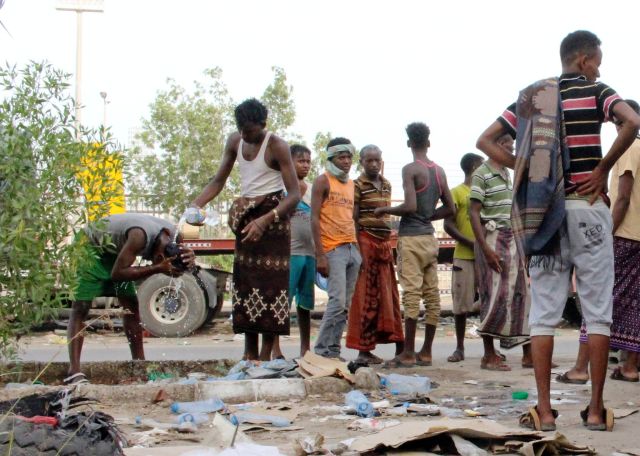 The return of Ethiopian migrant workers to their home country, some sick from the coronavirus, is straining Ethiopia’s healthcare system. (Reuters photo)
The return of Ethiopian migrant workers to their home country, some sick from the coronavirus, is straining Ethiopia’s healthcare system. (Reuters photo)
The New York Times
Stigmatized, out of work and facing dangers, migrant laborers are returning by the thousands — and may be fueling a growing outbreak in Ethiopia.
ADDIS ABABA, Ethiopia — Unemployed and shunned as possible coronavirus carriers, Ethiopian migrant laborers are returning home by the thousands, placing a huge strain on Ethiopia’s poorly equipped medical system.
More than 30,000 workers have re-entered Ethiopia since mid-March, according to the government, some of them after suffering abuse and detention in unhealthy conditions in the countries they left, often on the Persian Gulf or in other parts of Africa.
At least 927 migrant laborers were infected with the virus when they returned, Ethiopian officials say, but the true number is probably much higher. The government has not updated that figure for more than a month, and it does not include those who have slipped back into the country unnoticed.
Ethiopia has had more than 16,000 confirmed infections and 250 Covid-19 deaths, according to figures compiled by The New York Times. Those are very low counts for a nation of 115 million people, but the numbers are rising and many cases go undetected by the country’s sparse testing.
Doctors fear the outbreak may be primed to explode, fueled in part by returning migrants whose journeys often include crowded, unsanitary conditions — jails in the countries where they worked, informal migrant camps in countries like Yemen and Djibouti and quarantine centers once they arrive back in Ethiopia.
Dr. Yohanes Tesfaye, who runs a government Covid-19 treatment center near the eastern city of Dire Dawa, said that within a month of opening, the center had treated 248 infected migrants. And, he warned, “we have a long border, so we can’t be sure” whether many more people with the virus are entering the country undetected.
All this is occurring in a country that has just one respiratory therapist, ill-equipped public hospitals and few medical resources in rural areas, and is also suffering the economic blow of the pandemic. Major hotels in the capital city, Addis Ababa, are almost empty, jobs in tourism and construction have disappeared and the flow of money sent home by workers overseas has dried up.
Adding to Ethiopia’s struggles have been deadly conflicts between ethnic groups that prompted the government to shut down the internet for more than three weeks before recently restoring it. Hundreds of people died in clashes and anti-government protests following the killing in June of the singer Hachaluu Hundessa.
—
Related:
Ethiopia Coronavirus Cases Reach 17,999
Join the conversation on Twitter and Facebook.

























